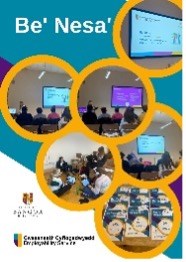Group Size
?
1.) Small group (teams of 4-6)
2.) Individual Task
3.) Large Group
4.) Any
Small group (teams of 4-6), Individual Task
Learning Environment
?
1.) Lecture Theatre
2.) Presentation Space
3.) Carousel Tables (small working group)
4.) Any
5.) Outside
6.) Special
Carousel Tables (small working group)
QAA Enterprise Theme(s)
?
1.) Creativity and Innovation
2.) Opportunity recognition, creation and evaluation
3.) Decision making supported by critical analysis and judgement
4.) Implementation of ideas through leadership and management
5.) Reflection and Action
6.) Interpersonal Skills
7.) Communication and Strategy
1Creativity and Innovation
2Opportunity recognition‚ creation and evaluation
This event was led by the Enterprise Education Development Coordinator, also the co-host of the Podcast. In addition, the other co-host, an Employability Adviser, and the Graduate Start-Up Coordinator were involved in content delivery on the day. The purpose of this event was to provide students with an authentic experience of pitching for a funded project, responding to a brief, working with a client, to name a few. The event had two contracts available, one focusing on the branding for the podcast, and the other, the music for the podcast. Following the pitches, two students were successful in gaining the contracts, with their work being used when the podcast launches in July 2023.
Part a) information session, focusing on in introduction to enterprising (freelance, self employment, sole trader etc), methods of reflecting on skills (including example models to follow) and the project brief, including contract details.
Part b) workshop time to develop content to pitch individually. Guidance provided about requirements of the pitch (see below) and staff acting as facilitators. Staff were available for questions around the brief and preparing for the pitch, but no feedback about ideas.
Part c) student pitches. Students shared what they had created in the workshop, their additional ideas and why they should be selected.
The employability service is launching a new podcast, Be’ Nesa’. As part of this, there are two contracts available for students to pitch for.
This is a professional podcast with hosts from the Employability Service engaging with a wide range of speakers from a range of backgrounds and a wealth of experience. Also, there will be some more informal segments of the podcast, including a Welsh language ‘challenge’ and an employability related quiz question. The intended listener for the podcast is current students, graduates and university employees.
What the students got:
Pitching;
We have provided some guidance below to help you prepare for your pitch, but remember, it’s only guidance. The criteria we will be using when considering your pitches has also been provided.
Maximum 3 minutes.
- State your chosen brief (music or branding).
- Who are you?
- Include something you’ve made / created in the session.
- You can focus on one area of the chosen brief, or an overall vision for how you would approach the brief if successful in winning the contract.
- Why we should choose you
Panel criteria
4 areas, each with three scoring areas (score from 1-5). Total out of 60. Panel members mark each presentation and collate to calculate average.
Scoring
1-None
2-Limited / varied
3-Predominantly good.
4-Consistently good standard.
1.Product / deliverable produced during the workshop.
a.Quality of product.
b.Depth versus breadth of project.
c.Clarity of idea and message.
2.Overall vision for the project and fit with the vision and purpose of the podcast.
a.Clear position of product in the bigger brief.
b.Awareness of how it would develop to other elements.
c.Appropriateness for the target audience including ability to engage the target audience.
3.Pitch delivery.
a.Enthusiastic, passionate about the idea, full of energy.
b.Relates to audience.
c.Spoke clearly, used easy to understand language.
4.Professionalism at the event.
a.Presentation and attitude (appropriate clothing, demeanour, social etiquette)
b.Attention (during presentations, to the brief, to instructions).
c.Communication (engaging with speakers, facilitators and peers).
Impact:
The main impact from the event was the personal and professional development of the students in attendance. Each student received the learning resources from the event, the experience itself, and detailed feedback on their pitch, which signposted to additional resources that may benefit them in the future. Two students were successfully selected to complete the two briefs and therefore worked with the wider service to deliver the contract.
Feedback from the event was positive from academics, primarily because of having an active project for students to focus their work to. The paid nature of the experience students were pitching for was explained prior to the event, which reflectively is considered to have improved the impact on the students attending as they were more invested in the activity.
The format of this event received positive feedback from Employability staff, academic staff, as well as students. In utilising a collaborative approach, designed with a specific group of students in mind, linked with academic's insights, resulted in a positive outcome. As a result of this event, this methodology is going to be adopted in any future opportunities we have for students to be involved in activity within the service. In my role working across the university, I hope to encourage academic staff to consider events like this to enable students to have authentic work experiences, as well as opportunities to develop their skills outside of the traditional lecture style activities.
Resources:
Pack for attendees to provide information about the day, including schedule, judging criteria for pitches, contractual information if a student was success (please contact me if you would like to view this).

References: